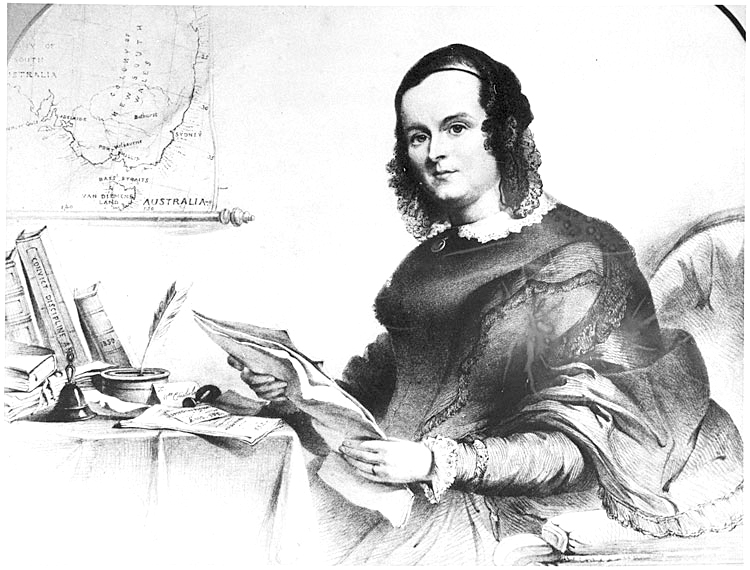|
The Australian Consulate-General, Chennai, a year ago honoured Sister Mary Theodore of MITHRA, whom many called ‘the Mother Theresa of South India’ for her work with the disabled. But the old records reveal an earlier Australia-Madras connection in the field of social work. Caroline Chisholm, celebrated as Australia’s pioneer in the field of immigration reform and humanitarian work, particularly women’s welfare, carried out her first social work in Madras.

An Australian postage stamp remembering Caroline Chisholm
Arriving in Madras in 1833 as a 25-year-old bride of Archibald Chisholm, a Captain in the Madras Army, Caroline was struck by the boisterous environment of the barracks which she felt was detrimental to the upbringing of the young daughters of the soldiers. She also felt the need for an institution to educate the girls in practical knowledge in addition to academics, which would help them in successfully running a home. So was born the Female School of Industry for daughters of European soldiers.
The Memoirs of Mrs.Chisholm, written in 1852 by Eneas Mackenzie, gives us insights into the functioning of the School.
The chief object of the institution was to “enable such European Soldiers as may feel disposed to remove their children from the Barracks and Putchery Lines(?)”. A house was procured in Black Town, where the children were instructed in reading, writing, arithmetic, needlework and domestic management. Religious instruction and moral conduct were given special attention.

Caroline Chisholm, the emigrants' friend.
The rules of the institution reflect the strict regimen that was followed. The students were to “get up at an hour so as to be able to take some recreation in the cool of the morning, either on the Beach or on the Esplanade” and had to assemble for prayers and meals at the ringing of the bells. They were not allowed to go into the Bazaar. Male visitors were strictly prohibited, unless specially sanctioned by one of the managers. A child withdrawn from the School was not eligible for re-admission. The girls “ran” the school themselves, with various committees being formed amongst them for the day-to-day activities.
Punishments were set out for various offences. For telling a lie, the student was punished by forfeiting of five tickets and by being kept separate from the other students for a day in the school room so that “visitors may at once know the offender”. A girl found sulky for six hours or a day was punished by a “low diet double the time”, while a girl who refused to assist in the making of a pudding could not enjoy the same.
Despite the seemingly regimental conditions laid down by Caroline Chisholm, a reading of her address to the Matron and Mistresses reveals her concern for the well-being of her wards. She exhorts them to be careful of their conduct, as “children learn more from example than precept and are generally close and faithful imitators of those they reside with.”
The School caught the attention of Sir Frederick Adams, the Governor of Madras, who subscribed 20 pounds towards the cause. In a matter of just five days, Rs.2000 was collected.
In 1838, Captain Chisholm’s health compelled him to leave Madras for a change of climate. This meant the end of Caroline Chisholm’s association with the School that she had founded. Along with their two children, Archibald Jr and William (born 1836 and 1837 respectively), the couple moved to Sydney, where Caroline began the next phase of her remarkable career.
Concerned by the poor state in which immigrants landed in Australia, Caroline began an Emigrants Home in Sydney against all financial odds. Enlisting the help of the Press, she advertised her cause and help began to flow in. She also managed to get an interview with the Governor, Sir George Gipps, who had “heard all sorts of stories about the wild schemes of Mrs. Chisholm.” He was instantly floored by her work and soon official help too was forthcoming. Caroline was so involved in her endeavour that when Archibald rejoined his home regiment in 1840, she stayed back with their children in Australia to continue her work. She travelled far and wide into the interior parts of the country with batches of immigrant girls and placed them under the care and guidance of the families of settlers. Archibald rejoined her in 1845 and in 1846 they set sail for England.
Her work in relation to the colony did not cease despite her relocation to England. Thanks to her continuous petitioning, the Government, at its own cost, reunited two shiploads of children left behind in England with their parents in Australia. Another of her achievements was the establishment of the Family Colonisation Loan Society, which aided easy immigration from England.
Caroline fell ill in 1855 and with her husband and four children, she moved to Victoria. The family finally relocated to London in 1866, where she spent the rest of her life. It was a difficult period, with the strain of all the hectic travel and social life taking a toll on her. She passed away in 1877 in Kensington West and was buried in her home town in Northamptonshire.
She may have died forgotten in England, but Australia did not forget her contribution to the cause of immigration and service to the society. In 1967, she became the first woman other than the Queen to be featured on the 5 dollar bank note. In 1994, she was posthumously awarded the Order of Australia. The administrative centre of the Department of Human Services of the Australian Government in Canberra is named the Caroline Chisholm Centre.
The trail of the institution that she founded in Madras runs cold after her departure to Australia. All available accounts, however, say that it was taken over by the Government and run successfully. Probably it was made a part of the Military Asylums.
-Karthik Bhatt
|

